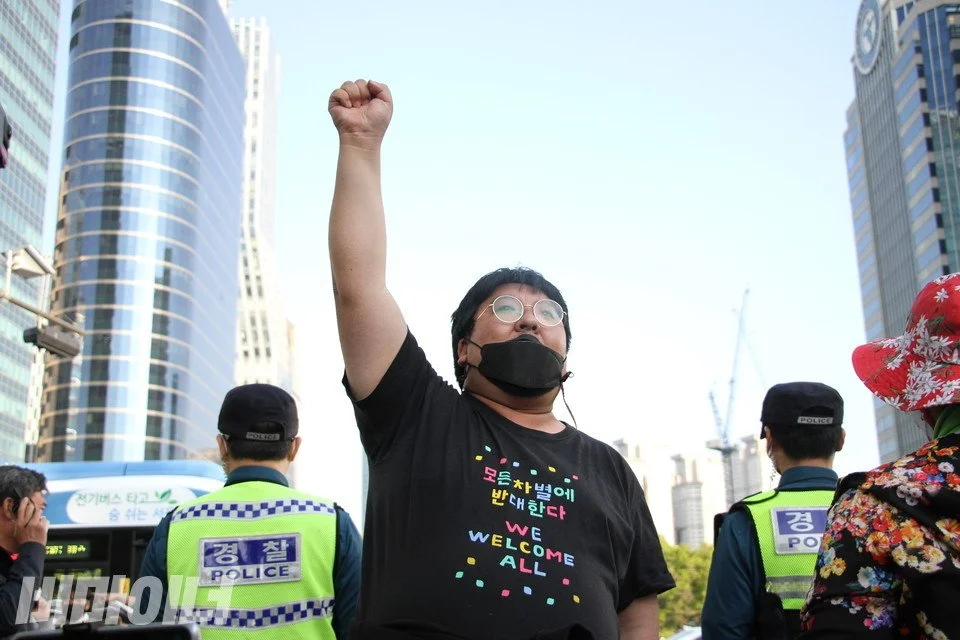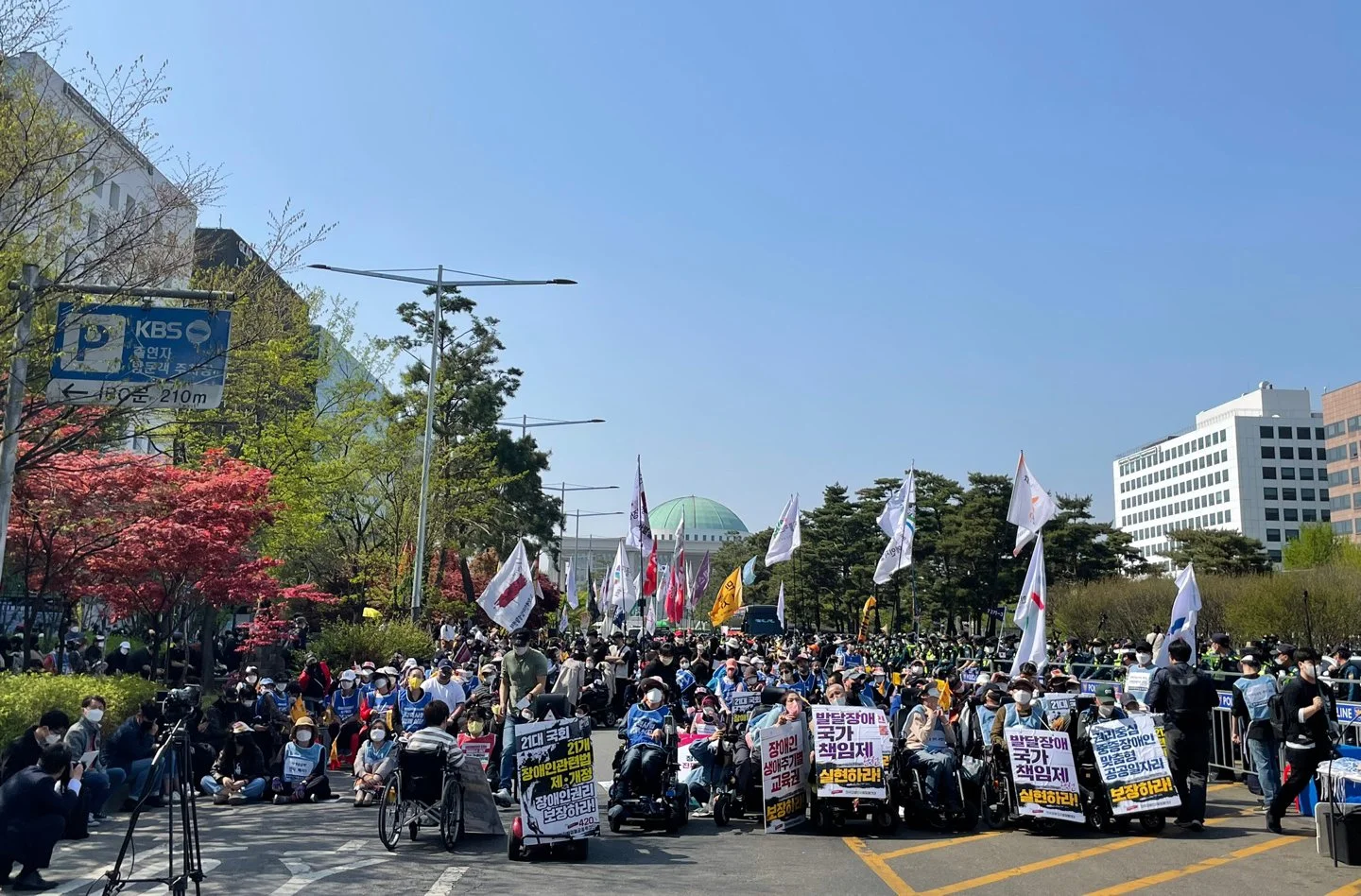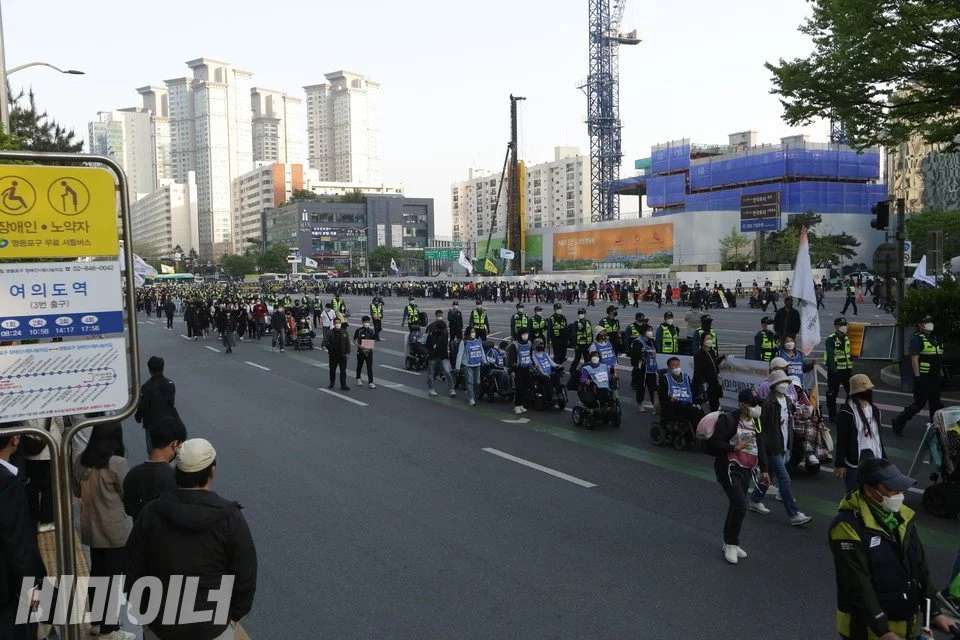The Struggle Never Ends - The Apr. 20 Protests Against Disability Discrimination
Park Chul Gyoon (ISC, Policy Research Team)
(Cheolkyun Park, Organizing Director of Solidarity Against Disability Discrimination (SADD), shouting out slogans at the forefront of the march / Source: BEMINOR)
In Korea, April 20th is designated as the Day of Disabled People. Initially, the day was known as the Day of Rehabilitation, announced in 1972 by Rehabilitation International Korea in commemoration of their general assembly. Then, in 1981, the Chun Doo-hwan military dictatorship re-designated the day as the Day of Physically and Mentally Disabled People. After the United Nations designated 1981 as The International Year of Disabled People, the Korean government renamed the day to the Day of Disabled People in 1982. Yet, while the name has undergone many changes since 1972, the fundamental reality of those with disabilities hasn’t changed.
In Korea, it seems people with disabilities only exist on April 20. Only on this day do politicians flock to the official ceremony to display their concern as famous singers perform on stage; as awards are handed to those who “overcame” their disability and are living like non-disabled people; and as stories of “normal people” who “helped” the disabled touch the hearts of many. However, once the day is over, people with disabilities are forgotten once again, and business goes on as usual, centered on non-disabled people. Disabled people who cannot “overcome” their disability and live like non-disabled people find themselves unable to travel freely, get education, or get work as before. Even worse, they might be confined to their homes or to facilities for the disabled under the pretense of “protection” just awaiting their deaths.
The movement for disability rights in Korea has been full-fledged since the 2001 struggle for the right to mobility. That year, the death of a person on a wheelchair after falling off a subway station lift sparked fierce protests and struggles demanding elevators at subway stations and low floor buses. Activists chained themselves to subway tracks and placed themselves in front of buses. The movement fought, often enduring insults, to expose society’s hypocrisy and change a society centered on the non-disabled towards one in which no one is marginalized.
In this context, the Joint Struggle Committee for the April 20 Protest Against Discrimination on Disability (the Joint Committee) was created in 2002. The Joint Committee resolutely rejected the hypocrisy of people thinking and talking about disabilities only on April 20. It initiated struggles calling for a society in which the disabled can live without discrimination. The Joint Committee launched a month-long struggle (the April 20 struggle) starting from the March 26 commemoration of Okran Choi, a disability activist who died after exposing the National Basic Livelihood System. The struggle culminated on April 20 and completed its journey at the Mayday protest on May 1. However, the movement continued fighting for the demands of the Committee even after the April 20 struggle, amplifying the voices of disabled people.
Koreans with disabilities have struggled relentlessly against discrimination and marginalization for the past 20 years. To demand the introduction of a care service for people with disabilities and demand that the Seoul Metropolitan government scrap its plan for building an opera house on a Han River islet, activists got off their wheelchairs and, for over 4 hours, crawled across the Han River Bridge. In addition, the movement called for deinstitutionalization of people with disabilities because they should live within the community, not be confined in a disability institution. Other critical issues were the disability rating system, which provides selected services to the disabled based solely on their physical disability ratings, and the obligatory support system, under which the state dumps the welfare burden onto disabled individuals and their families.
(556 citizens and parents of the disabled shaved their hair in front of the Blue House to demand a national plan for caring the developmentally disabled, Apr. 19, 2022)
(The biggest ever Apr. 20 Protest Against Discrimination on Disability was held, Apr. 20, 2022)
This year’s Joint Committee also showed that Koreans with disabilities are still fighting fiercely after 20 years. The struggle only intensified when the chair of the conservative party instigated greater hostility by disparaging the movement for carrying out its morning subway station protests. The Korean disability rights movement has successfully won the rights to work, mobility, disability support, and living within the community. However, insufficient budgets (well below the OECD average) mean that these disability-related policies cannot be fully realized. That is why the disability rights movement continues to struggle for the procurement of adequate budgets for deinstitutionalization of disabled people. Therefore, to get a proper answer from the Presidential Transition Committee, every morning, one to two people with disabilities have shaved their heads as a sign of their commitment and determination for the struggle.
Activists also took over subways to let the public know about the issue. When the Presidential Transition Committee failed to provide a proper response on April 21, people with disabilities got off their wheelchairs and crawled across the floor of subway cars showing that they also want to live with non-disabled people.
As prominent political figures continued instigating greater hostility towards the disability rights movement, activists faced greater insults and threats at the protest sites and online. Some detractors even took pictures in front of the office of Solidarity Against Disability Discrimination (SADD) without permission and stalked disability rights activists.
(Participants marching after the April 20 protest / Source: BEMINOR)
(Kyeong-seok Park, SADD Co-representative, crawling the floor of a subway car. The back of his black jacket reads: “We want to take a bus! Disability Transit Solidarity” / Source: BEMINOR)
However, the Korean disability rights movement continues moving forward in its struggle unfazed. The movement in 2022 showed that Korean society is still a difficult place for those with disabilities. We continue building with civil society and the public a strong solidarity against hatred and discrimination. This year’s April 20 protest was the biggest ever, and lots of people showed their support by participating in the protest or sending donations to SADD. More and more people are joining the disability rights movement.
The Joint Struggle Committee disbanded this past May 1. However, as always, the disability rights movement will continue all through 2022, exposing and addressing the contradictions in Korean society and leading the way forward towards a society where no one is left behind.
Solidarity with the Korean disability rights movement!
Leave No One Behind!





